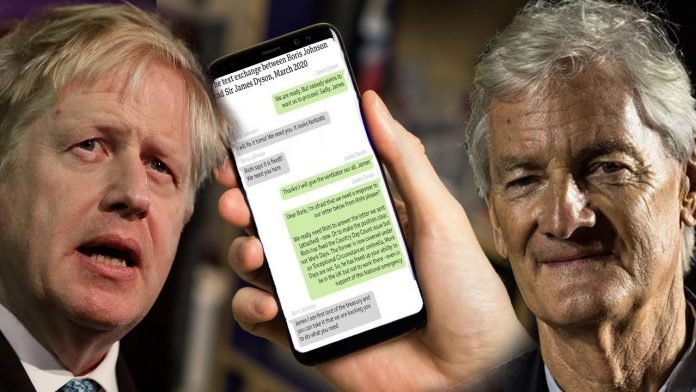NEWS
Boris Johnson assured Sir James Dyson his employees would not have to pay extra tax if they came to the UK to make ventilators during the pandemic.
It is claimed that Boris Johnson personally assured Sir James Dyson that the billionaire inventor’s employees would not have to pay extra tax if they came to the UK to make ventilators during the pandemic
Sir James, whose firm is now based in Singapore, wrote to the Treasury to ask for no change in tax status for staff.
But in text messages sent in March 2020 – seen by the BBC – Sir James then went directly to the PM, with Mr Johnson replying: “I will fix it.”
The government said it did everything it could to get the right equipment.
And Sir James said it was “absurd to suggest that the urgent correspondence was anything other than seeking compliance with rules” and that his company did not receive “any benefit from the project”.
Labour called the revelations “jaw-dropping”, with shadow business minister telling the BBC: “Frankly it stinks that a billionaire businessman can text the prime minister and get an immediate response and, apparently, an immediate change in policy.”
Dyson, initially wrote to the Treasury but after not receiving a reply exchanged text messages with the prime minister in which Johnson pledged: “I will fix it tomo! We need you. It looks fantastic.”
The prime minister then texted him again, saying: “[Chancellor] Rishi [Sunak] says it is fixed!! We need you here,” according to the BBC.
When Dyson then sought a further assurance, Johnson replied: “James, I am first lord of the Treasury and you can take it that we are backing you to do what you need.”
Two weeks later, Sunak told the Commons Treasury committee that the tax status of people who came to the UK to provide specific help during the pandemic would not be affected.
The exchange took place in March 2020 at the start of the pandemic when the government was appealing to firms to supply ventilators amid fears of shortages.
On Tuesday, the culture secretary, Oliver Dowden insisted Johnson had acted correctly, given the context.
“James Dyson came forward with a proposal that didn’t benefit him and it certainly didn’t benefit the prime minister personally and said, ‘Look, if we can get our people across here and they’re not penalised for it, they’ll be able to help with a ventilator challenge,’” he told BBC Radio 4’s Today programme.
“That helped with the ventilator challenge. We massively increased the number of ventilators and as a consequence, saved possibly thousands of lives. I think it was the right thing to do in the middle of a national emergency.”
Asked whether the national emergency meant the ministerial code was suspended, meaning the prime minister could text a senior businessman without officials being present or a record of the exchange being kept, Dowden said: “The normal rules existed but we had to move at pace.”
The BBC reported that Dyson’s company later shared the texts with officials but it is unclear whether Johnson flagged the exchanges as the rules suggest he should.
A Whitehall source said Dyson did not text the chancellor, Rishi Sunak, directly and that the only correspondence received by the Treasury was official letters from Dyson’s holding company, Weybourne, asking Sunak for assurances on their tax status.
The Treasury later wrote back to confirm what Johnson had promised Dyson. Another Whitehall source said there was “a process to be followed” – a hint that the Treasury may not have been prepared to make similar informal assurances as Dyson received from No 10.
“Rishi says it is fixed!!”
— Anneliese Dodds ? (@AnnelieseDodds) April 21, 2021
What else did he fix, and for whom?
We need answers. pic.twitter.com/UI3rPhUAia
On 9 April, two weeks after the reported exchange of texts between Johnson and Dyson, Sunak told the Treasury select committee group that the tax status of people who came to the UK to provide specific help during the pandemic would not be affected.
Dyson told the BBC he was “hugely proud” of his firm’s response in “the midst of a national emergency”, and that he would do the same again if asked.
He said: “When the prime minister rang me to ask Dyson to urgently build ventilators, of course I said yes.
“Our ventilator cost Dyson £20m, freely given to the national cause, and it is absurd to suggest that the urgent correspondence was anything other than seeking compliance with rules, as 450 Dyson people – in UK and Singapore – worked around the clock, seven days a week to build potentially life-saving equipment at a time of dire need.
“Mercifully, they were not required, as medical understanding of the virus evolved. Neither Weybourne [Dyson’s holding company] nor Dyson received any benefit from the project; indeed commercial projects were delayed, and Dyson voluntarily covered the £20m of development costs.”
Dyson also said his company had not claimed “one penny” from governments in any jurisdiction in relation to Covid.
During PMQs, Boris Johnson came under attack for the apparent ‘Tax by text’ but used an argument and the moral high ground suggestion that lives needed saving and ventilators building.
At prime minister’s questions on Wednesday, Johnson was bullish about his response, saying: “I make absolutely no apology at all for shifting heaven and earth and doing everything I possibly could, as any prime minister would in those circumstances, to secure ventilators for the people in this country and to save lives.”
The SNP leader, Ian Blackford, said the prime minister must “publish all personal exchanges on these contracts before the end of the day”.
Johnson said: “There’s absolutely nothing to conceal about this and I am happy to share all the details with the house, as indeed I have shared them with my officials immediately.”
Starmer said the story showed the prime minister was “lobbied by a wealthy businessman and a close friend for a change in the tax rules. The prime minister responded, I’ll fix it.”
The Labour leader said the texts raised serious concerns about preferential treatment for those with the prime minister’s personal number. “How many other people with the prime minister’s personal number has he given preferential treatment to?”
He said that at the heart of the lobbying scandal, including the lobbying by David Cameron to Sunak on behalf of the now-collapsed Greensill Capital, were “people’s jobs and wasted taxpayers’ money.”.
He said thousands of jobs at Liberty Steel were on the line in Hartlepool and Rotherham following Greensill’s collapse. “The prime minister hasn’t fixed that, in fact he’s done nothing to help steel workers. Is it now quite literally one rule for those that have a prime minister’s own number, and another for everybody else?”
Johnson said Starmer was disparaging the ventilator challenge, of which Dyson was part, and had previously attacked the vaccines’ taskforce, both of which he said had delivered great results. Dyson’s ventilators were never approved for use in the NHS for Covid-19 patients.
‘“We take the tough decisions that are necessary to protect the people of this country and get things done,” Johnson said.
Starmer said there was “a pattern to this government” – referencing Cameron’s texts to Sunak and other ministers and officials and the informal drink between health secretary Matt Hancock and Cameron with Greensill’s founder.
“Every day there are new allegations about this Conservative government. Dodgy PPE deals, tax deals for their mates, the health secretary owns shares in a company delivering NHS services. Sleaze, sleaze, sleaze, all on his watch. With this scandal now firmly centered on him, how on earth does he expect people to believe that he is the person to clean this mess up?”
The number of lobbying scandals across Westminster has prompted multiple inquiries into Greensill and the accountability of ministers and officials, including an independent inquiry by corporate lawyer Nigel Boardman, ordered by No 10.
Ministerial code
The messages have come to light amid an ongoing row over lobbying in Westminster.
According to the ministerial code – a list of rules setting out the standards of conduct expected of ministers – “a private secretary or official should be present for all discussions relating to government business”.
And if a minister “finds themselves discussing official business without an official present” – such as at a social event or on holiday – “any significant content should be passed back to the department as soon as possible after the event”.
The code also says ministers “must act and take decisions impartially, fairly and on merit, using the best evidence and without discrimination or bias” and that they should “act and take decisions in an open and transparent manner”.
But there is widespread concern about informal contacts and lobbying between government and business after the revelations that former Prime Minister David Cameron sent texts to the chancellor and other ministers on behalf of the failed finance firm Greensill Capital.
Support Independent Journalism Today
Our unwavering dedication is to provide you with unbiased news, diverse perspectives, and insightful opinions. We're on a mission to ensure that those in positions of power are held accountable for their actions, but we can't do it alone. Labour Heartlands is primarily funded by me, Paul Knaggs, and by the generous contributions of readers like you. Your donations keep us going and help us uphold the principles of independent journalism. Join us in our quest for truth, transparency, and accountability – donate today and be a part of our mission!
Like everyone else, we're facing challenges, and we need your help to stay online and continue providing crucial journalism. Every contribution, no matter how small, goes a long way in helping us thrive. By becoming one of our donors, you become a vital part of our mission to uncover the truth and uphold the values of democracy.
While we maintain our independence from political affiliations, we stand united against corruption, injustice, and the erosion of free speech, truth, and democracy. We believe in the power of accurate information in a democracy, and we consider facts non-negotiable.
Your support, no matter the amount, can make a significant impact. Together, we can make a difference and continue our journey toward a more informed and just society.
Thank you for supporting Labour Heartlands












